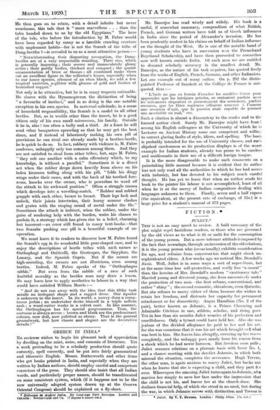GREECE IN INDIA.*
No reviewer wishes to begin his pleasant task of appreciation by dwelling on the mint, anise, and cummin of literature. Yet a work pretending to be a scholarly production should quote correctly, spell correctly, and be put into fairly grammatical and idiomatic English. Messrs. Butterworth and other firms who get books printed in India, and especially when they are written by Indian authors, should employ careful and competent correctors of the press. They should also insist that all Indian words, and particularly proper names, should be transliterated on some consistent system, which (if it happens not to be the now universally adopted system drawn up at the Geneva Oriental Congress) should be explained on a fly-sheet.
• Helletrient Tn Ascknt India. By Ganroura Bath Banerjee. London and Calcutta! Butterworth and Co. f7 rupees 8 awns nett
Mr. Banerjee has read wisely and widely. His book is a useful, if somewhat summary, compendium of what British, French, and German writers have told us of Greek influences in India since the period of Alexander's invasion. He has been prudently modest in his claims on behalf of Indian influence
on the thought of the West. He is one of the notable band of young students who have in suce ession won the Premchand Roychand Scholarship, and have then proceeded to researches now well known outside India. Of such men we are entitled to demand scholarly accuracy in the smallest detail. Mr.
Banerjee, as the nature of his task requires, has quoted freely from the works of English, French, German, and other Indianists.
Let one example out of many suffice. On p. 292 the distin- guished Professor of Sanskrit at the College do France is mis- quoted thus :-
" L'Inde ne pas en besoin d'etudier lea modCles Grecs pour apprendre quo lea intrigues priveea, se croisaient parfois avec les trib unaux siegeaient et prononcaient des sentences, parfois erronees, que les fates regieuses offraient souvent 1 l'amour une occasion d'agir, quo le passion etait capable de pousser une amefoible ou mal," etc.
Such a citation is almost a discourtesy to the reader and to the learned author cited. Surely Mr. Banerjee might have foun I
among his English colleagues at the University of which he is Lecturer on Ancient History some one competent and willing to correct glaring faults of style, idiom, and spelling. The book is probably intended for the use of University classes, and such slipshod carelessness as its production displays is of the worst example for Indian students, already too prone to be careless and unidiomatic in their use of a difficult foreign tongue.
It is the more disagreeable to make such comments on a
painstaking little manual because it is evident that its author has not only read all the authorities to which he has had access
with industry, but has devoted to his subject much careful thought. He has yet to learn that when an author sends his book to the printer his labour is not accomplished, least of all when he is at the mercy of Indian compositors dealing with
languages unknown to them. Finally, seven and a half rupees (the equivalent, at the present rate of exchange, of Ifs.) is a large price for a student's manual of 373 pages.










































 Previous page
Previous page